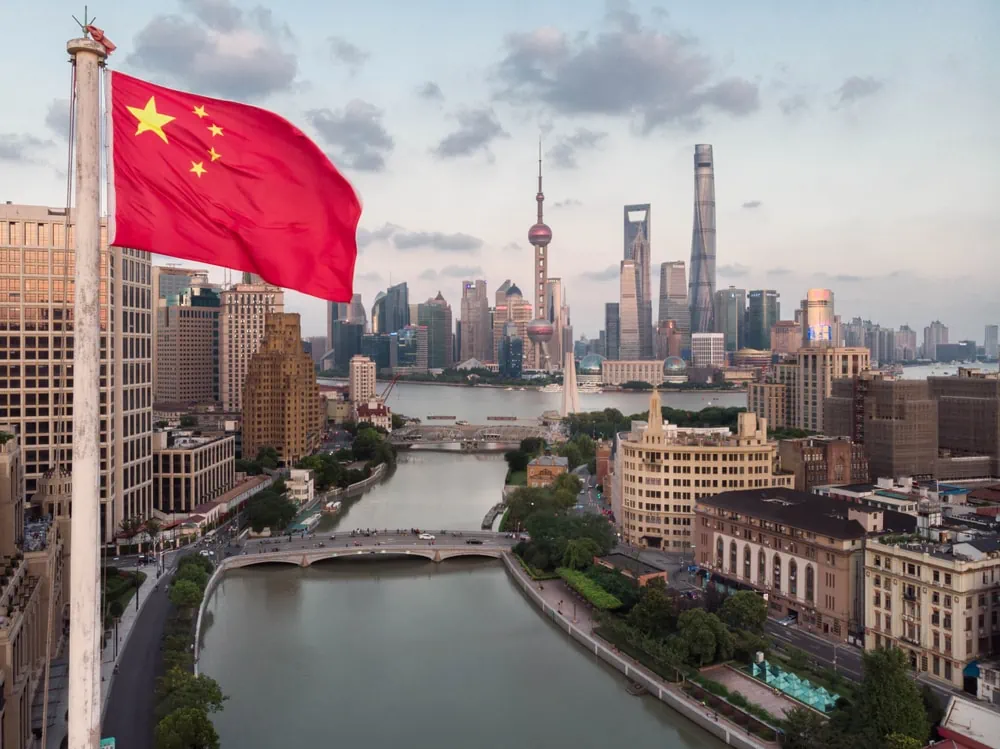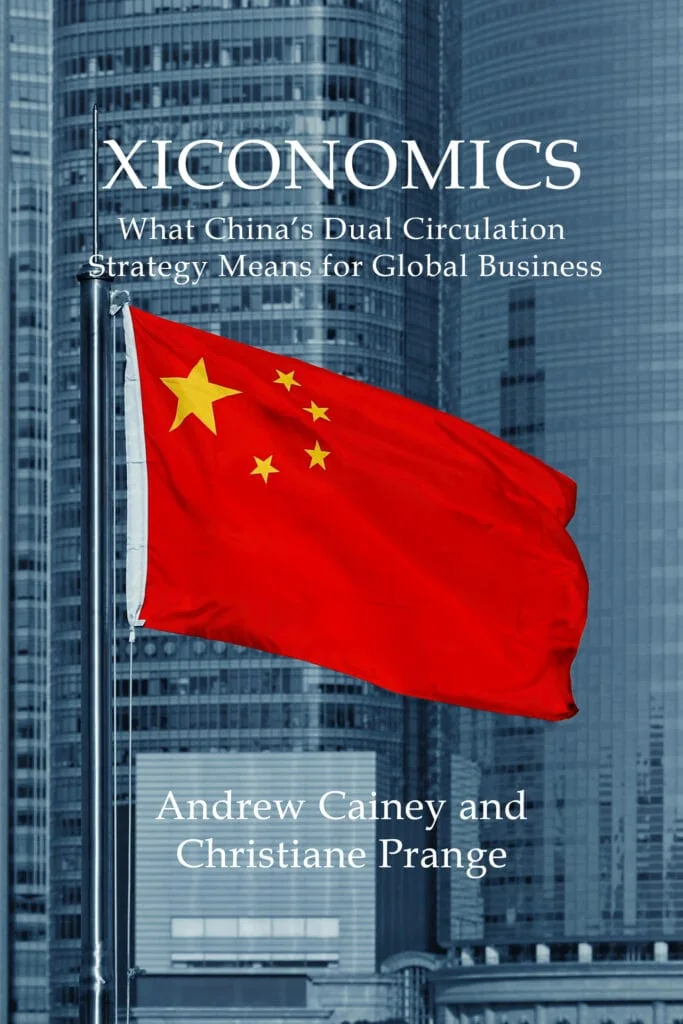The media often throw around terms like ‘Dual Circulation Strategy’, ‘friendshoring’, and ‘Xiconomics’ in relation to China’s economic policies, but what do they actually mean? And how could they affect your business in China? Paul French speaks to the authors of a new book that explores these crucial questions
Andrew Cainey and Christiane Prange’s Xiconomics: What China’s Dual Circulation Strategy Means for Global Business (Columbia University Press) is perhaps one of the first books to do a serious deep-dive on Xi Jinping’s economic strategies – as they were, as they are and as they are evolving.
Cainey has been advising businesses and governments on China for over twenty years, is a senior associate fellow at the Royal United Services Institute and a founding director of the UK National Committee on China. Christiane Prange is a Professor of Strategy and International Business with universities in Europe and globally. She previously taught at Tongji University and Jiaotong University (Antai College) in China. She also advises multinational companies on their internationalisation and agility strategies.
Paul French caught up with Cainey to talk dual circulation strategies, friendshoring, the National Unified Market, localisation and, crucially, where Xiconomics is headed.
What is Xiconomics, and how is it being implemented? How is the Dual Circulation Strategy a part of that?
Xiconomics is an English language term that Chinese state media have been using since the 19th Party Congress in 2017. The word is a sign really of the personal imprint Xi is putting on economic policy – a domain previously more handled by the Premier than the President. It reflects the more formal term in Chinese: ‘Xi Jinping Economic Thought on Socialism with Chinese Characteristics for a New Era.”
In 2020, Xi announced the Dual Circulation Strategy, which is important as both a framework and as a strategy. Taken as a framework, Dual Circulation is a simple view of the world economy that marks out a clear dividing line between the domestic economy (‘internal circulation’) and the rest of the world (‘external circulation’). It then describes how the two domains should interact (‘mutual reinforcement’). This framework is a change. In the late 1980s, China talked of ‘entering into the great international circulation’. Now the focus has shifted to two distinct ‘circulations’ that are to be managed differently. In China, Xi Jinping has declared the Party ‘leads everything’. Overseas it does not.
This framework sets up strategic choices. Is the internal or the external more important? What does internal circulation look like, and how does it operate? How do the two relate to one another? Since 2020, Xi has articulated a consistent strategy. The ‘internal is to be the mainstay’, with a greater role for domestic demand and a focus on technology upgrading. This reduces China’s reliance on critical imports and increases China’s own capabilities. Of course, things do not always work out quite as planned. And exports have played a stronger role in the economy recently in the face of weakened domestic demand.
Many countries are talking of decoupling from China, ‘friendshoring’ or at least ‘China+1’ in manufacturing. How does Xiconomics react to this challenge?
As always, there are multiple strands. Xiconomics is in large part about China’s own version of decoupling or derisking: minimising so-called ‘choke-points’. Success will mean a change in the mix of manufacturing activity in China – a shift from lower-end activities such as textiles to more innovative and sophisticated products. So in a sense, some relocation of – more basic – manufacturing away from China is a desired result.
But China still very much wants foreign investment. It is Western companies and governments that are seeking to move out of China – not China pushing them out. Premier Li Qiang has argued against the G7’s new ‘de-risking’ strategy, maintaining that interdependence is a better way to reduce risks. This is, in part, rhetoric and at odds with China’s own focus on self-reliance. It is also an attempt to put boundaries on decoupling. Chinese leaders are sending warm messages to foreign businesses. Provincial and city leaders are especially keen to put out the welcome mat. However, these messages jar with what many foreign companies are experiencing with security clampdowns.
Chinese companies are also dealing with these day-to-day realities – and are moving some manufacturing out of China. In part this is to work around Western tariffs on exports from China, in part to make their own supply chains more resilient and adapt to the changing economics of manufacturing in China.
You point to some factors adversely affecting China’s economy – the recovery from Covid-19, the deep-seated problems in the property market, and local government bad debt. How are these big problems affecting the development and implementation of Xiconomics?
They are having a big effect. Xi has emphasised the domestic economy as ‘the mainstay’ (as opposed to exports to the world). Yet, since his announcement of Dual Circulation in 2020, sustained export growth has offset weakened domestic demand. Exports can’t keep playing this role – increasing protectionism, China’s already large share of global manufacturing, and competition from Vietnam and elsewhere will see to that. So focusing on the domestic still makes sense – but that means fixing problems at home.
And that’s not easy. This is where Dual Circulation is actually more of a slogan than a strategy. The strategy is to focus on the domestic economy. Yes, China announced in 2022 a push to build the ‘National Unified Market’ – to improve ‘circulation’ at home by removing barriers to trade and economic activity within China. But otherwise, just calling it ‘circulation’ doesn’t solve China’s long-standing policy challenges – a declining workforce; an ageing population with limited pensions support; consumption taking a low share in the national economy; too much reliance on real estate; and high debt levels. On top of this, Covid lockdowns have used up savings for many people and reduced business confidence.
So day-to-day economic policy is now more directly focused on how to bolster China’s economy. As ever, the focus is mostly on the supply side, including interest rate cuts and measures to encourage lending and investment. China still steers clear of actions that would directly stimulate consumer demand – in part for ideological reasons of not wanting to encourage ‘welfarism’. And that’s a problem.
Xi has said that ‘security and ideology will play a critical role in China’s future economic development’. How has this domestic imperative played out for Western manufacturers, brands and service providers, given issues in sectors as diverse as consultancy to education?
Xi Jinping has always defined security in a broad way. He launched his ‘Comprehensive National Security Concept’ in 2014 with sixteen types of security – cultural, political, biological, economic, information and so on alongside the usual military definition. ‘Internal security’ is a big focus – but foreign influences of all kinds are increasingly portrayed as a security risk too.
Foreign companies need to reckon – as do Chinese companies – with a series of new laws that address security in this broad way. The past few months have seen raids on research firms and allegations of providing sensitive security-related data. But under Chinese law, almost any information can be deemed a security risk. Most recently, China has announced a new ‘Anti-espionage Law’ and a ‘Foreign Relations Law’.
Other countries have legislated in these areas too. What marks out Chinese legislation is the ambiguous phrasing. It is unclear what’s covered and what’s not. It’s also unclear how rigorously the laws will be enforced. The Chinese legal system is subordinated to the Communist Party, so there is no independent rule of law, and it is hard to judge where the red lines are. Yet the personal and corporate consequences of getting it wrong can be severe indeed. None of this makes for an easy environment for business decisions. Ambiguous legislation is, however, nothing new in China. In some ways, the new legislation just documents and reminds people of the uncertainty that has always been there.
In education, ideology and security perspectives have come together. The 2021 crackdown on private tutoring companies banned for-profit activity in core education services. The need to teach the approved national curriculum and not refer to sensitive issues, even in international schools, has reinforced the ideological approach across all education.
You say localisation is becoming more important than ever. But companies have been localising for decades; how much further can, and should, localisation go for British companies in China?
Companies have indeed been localising for years – developing products specific to the China market based on consumer needs, bringing R&D and manufacturing into China. The Chinese market is now bigger and diverging further from Western practices. Both trends speak to a need to do more.
Volkswagen stands out as an early ‘localiser’ that built a strong market position. Yet they’ve fallen behind, especially as the EV market took off. VW still made too many decisions too slowly back at headquarters and were slow to develop digital partnerships in China. They’re moving now to let the China business make their own decisions more quickly, investing more in digital and even saying that technology developed in China may simply stay in China.
Astra Zeneca also received media attention recently when its China CEO said that it will seek to be a patriotic company that “loves the Communist Party”. Such sentiment chimes well with China today. It may, though, play quite differently to Western audiences. HSBC receives criticism in the UK when it complies with Hong Kong’s National Security Law. Yet legal compliance is a non-negotiable for any company, while not removing the challenge of dealing with diverging opinions.
You say in your conclusion that foreign companies need to be ready for positive, as well as negative, scenarios for the Chinese economy. What is your most likely scenario for the development of Xiconomics and the Chinese economy in the next five years?
As Niels Bohr wrote, “Predicting is hard, especially about the future.” How China’s economy develops will depend both on what happens in China and what happens overseas, especially related to Western policy on China. Right now, the prospects are for slower, fitful growth – as Beijing grapples with the economic problems I’ve outlined. There is little sign of appetite for the major policy reforms needed to boost consumption. At the same time, massive government spending and China’s natural entrepreneurial energy make likely at least pockets of success in adapting and developing technology. This would mitigate the worst impacts of US semiconductor sanctions. China still looks set to continue innovating in digital, renewables and EVs.
It is unlikely that Xi will dramatically change course. But smaller, tactical adjustments are likely – leading is always a balancing act. This year has seen a clear tilt to emphasising the economy – in the face of slowing growth – yet security and ideology are also never far from the headlines.
From the outside, observers often argue that China is on the point of collapse – or that it is an unstoppable force of nature. Somehow China keeps going. Warren Buffett once said that it’s a terrible mistake to bet against America. Equally, it would be a big mistake to underestimate China.





